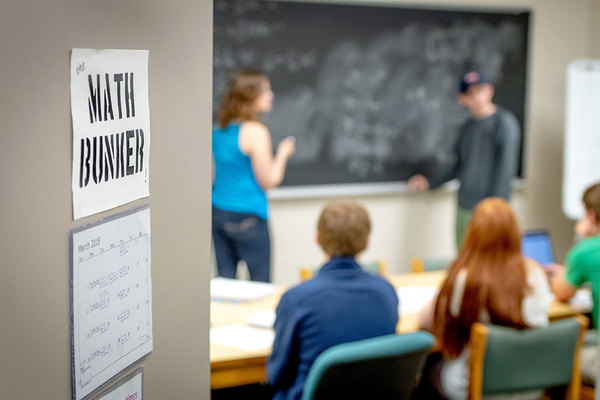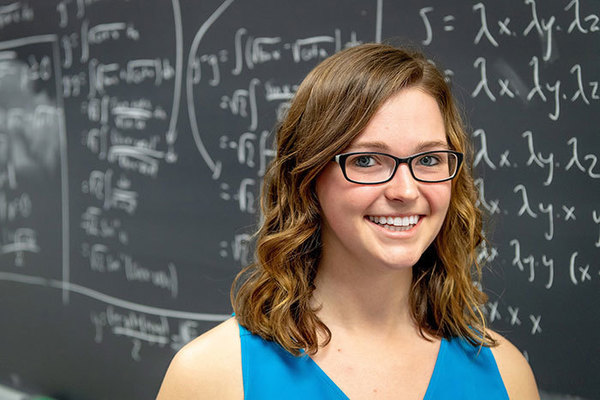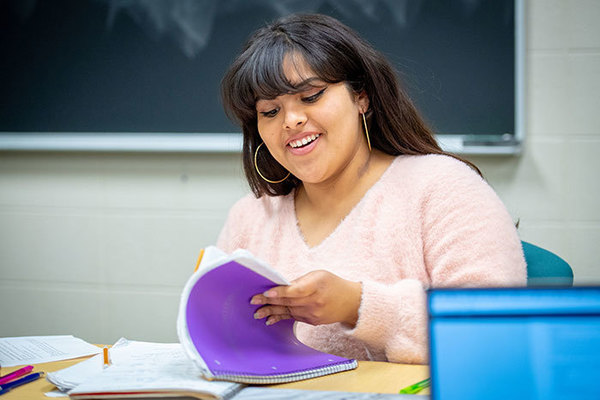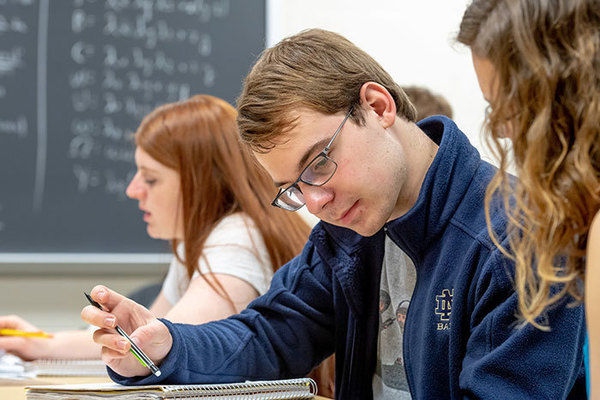
The Honors Calculus I and II courses are not for the faint of heart.

Even the class description serves as a warning: “This is not your high school Calculus course…whether you have had calculus or not, this course will challenge you in many ways.”
 Caitlyn Booms
Caitlyn Booms
“Honors Calc I my freshman year was the first math class I remember taking where I didn’t immediately understand what was happening,” said Caitlyn Booms, now a senior honors mathematics major who organizes tutors for the Math Bunker, a tiny tutoring room inside the mathematics library in Hayes-Healy Hall. “That’s a really difficult thing to go through, especially if you’re going through it alone.”
The Math Bunker tutoring program bridges that gap, serving students who want proof-based math tutoring and mentoring. Jeffrey Diller, professor and chair of the Department of Mathematics, began the program to provide some help for challenging math courses and to facilitate connections among those in different years of study.
Almost all students who begin the honors math degree find themselves stumped during their first course, and are encouraged to work in groups to brainstorm solutions to problems.
 Kassandra Perez
Kassandra Perez
Two tutors, usually junior and senior honor mathematics majors, staff the Bunker each night from Sunday through Thursday. The room is packed most nights with 10 to 15 students.
First-year honors mathematics students Kassandra Perez and Dillon Hasenour started attending during the fall semester. Perez quickly realized it was crucial to hear everyone’s thoughts on how others tackled a problem.
“The tutors don’t try to give you an answer, but do try to guide you in the right direction,” she said. “It’s really helpful.”
 Dillon Hasenour
Dillon Hasenour
The honors calculus material was different than any work Hasenour had done before, he said. “We did proofs in high school geometry, but this is not the same thing at all. For some problems you need to know little ‘magic tricks’ to pull out to finish the problem, so it’s just really helpful to bounce ideas off other people.”
The Math Bunker is a valuable place for tutors to share their own experiences with the honors mathematics program. Booms mentors students by assuring them that it’s perfectly normal to not understand everything by the end of the course. She also reminds students that the learning curve for proof-based mathematics is steep, but once they can get over the hump, everything is easier.
Booms recently had coffee with a student who was concerned about the time she needed to put into the program—which is quite common. Fall classes usually average 30 students, and by the end of the year, perhaps only half remain.
“We talked for about an hour, and in the end I told her I’ve gone through the same process,” said Booms, who will be attending the University of Wisconsin-Madison to pursue her doctorate in mathematics. She said that tutoring at the Bunker expanded her horizons, as she found she loves both math and helping others.
The student decided to stick with the honors math major, but even if she hadn’t, Booms said, “that’s okay, because this is not for everyone…and that’s totally okay.”
Diller is pleased with the tutoring program hopes to expand it. The students and tutors would love to see that happen as well.
“It wasn’t anything I expected it would be, but it turned into such a friendly atmosphere,” said Hasenour.